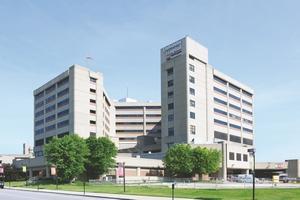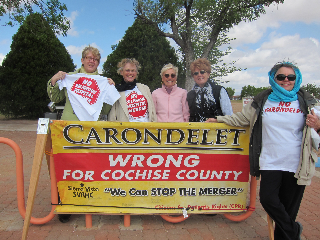Hospital Mergers: Recent Cases
Bremerton, WA
 After considering proposals from three potential partners, Harrison Medical Center has affiliated with Franciscan Health System, a large division of Catholic Health Initiatives based in Tacoma, WA. The 262-bed, non-profit facility is the only full-service hospital on the Kitsap Peninsula. The next closest acute care hospitals are in Seattle, an hour-long ferry ride away. Health care advocates and MergerWatch staff met with hospital leadership to express concerns about the alliance and received reassurances that Bremerton will remain a secular facility with the exception of two services: abortion and aid-in-dying. Advocates will continue to monitor this new partnership.
After considering proposals from three potential partners, Harrison Medical Center has affiliated with Franciscan Health System, a large division of Catholic Health Initiatives based in Tacoma, WA. The 262-bed, non-profit facility is the only full-service hospital on the Kitsap Peninsula. The next closest acute care hospitals are in Seattle, an hour-long ferry ride away. Health care advocates and MergerWatch staff met with hospital leadership to express concerns about the alliance and received reassurances that Bremerton will remain a secular facility with the exception of two services: abortion and aid-in-dying. Advocates will continue to monitor this new partnership.
Little Rock, AR
 Local sources were alarmed last summer to hear that University of Arkansas for Medical Sciences and St. Vincent Health System, a unit of Catholic Health Initiatives, were exploring some sort of partnership. A consulting firm prepared for the Board of Trustees a summary of various transaction options this spring. MergerWatch, Catholics for Choice and National Women's Law Center assisted local activists and advocates by sending a letter of concern to the board. Talks shut down after constitutional concerns chipped away at any workable affiliation proposal. We are thrilled that UAMS’ long tradition of providing a full range of reproductive health services will now continue.
Local sources were alarmed last summer to hear that University of Arkansas for Medical Sciences and St. Vincent Health System, a unit of Catholic Health Initiatives, were exploring some sort of partnership. A consulting firm prepared for the Board of Trustees a summary of various transaction options this spring. MergerWatch, Catholics for Choice and National Women's Law Center assisted local activists and advocates by sending a letter of concern to the board. Talks shut down after constitutional concerns chipped away at any workable affiliation proposal. We are thrilled that UAMS’ long tradition of providing a full range of reproductive health services will now continue.
Orange County, CA
 MergerWatch received an anonymous phone call and later a letter from a concerned resident of Orange County, CA regarding plans for St. Joseph Health System and Hoag Memorial Presbyterian Hospital to create an affiliation. Initial press indicated that the two organizations would retain their separate faith-based identities. However, in an impact statement prepared by an independent consulting firm for the Office of the California Attorney General, it was revealed that Hoag would be subject to a “Statement of Common Values” which prohibits “direct” abortions. The report concluded that because “just a small number of patients would be affected; the impact on accessibility and availability of this service was small.” MergerWatch quickly drafted a letter to the CA Attorney General –which we co-signed with California Latinas for Reproductive Justice –demanding a more comprehensive review of the affiliation’s potential impact on patient access to reproductive health services.
MergerWatch received an anonymous phone call and later a letter from a concerned resident of Orange County, CA regarding plans for St. Joseph Health System and Hoag Memorial Presbyterian Hospital to create an affiliation. Initial press indicated that the two organizations would retain their separate faith-based identities. However, in an impact statement prepared by an independent consulting firm for the Office of the California Attorney General, it was revealed that Hoag would be subject to a “Statement of Common Values” which prohibits “direct” abortions. The report concluded that because “just a small number of patients would be affected; the impact on accessibility and availability of this service was small.” MergerWatch quickly drafted a letter to the CA Attorney General –which we co-signed with California Latinas for Reproductive Justice –demanding a more comprehensive review of the affiliation’s potential impact on patient access to reproductive health services.
Three months after receiving state approval, Hoag Memorial Hospital Presbyterian announced that it would no longer provide ‘direct abortion’ services. The change in policy was a shock to the community and Hoag obstetricians, who had been repeatedly told that the affiliation would not affect their practice. The CEO of Hoag publicly defended the decision and insisted it had nothing to do with the religious rules of its affiliation partner. Instead he said the change was necessary due to the low volume of abortion procedures being provided.
Local women’s groups staged a large protest outside of the hospital to express their disappointment in the hospital’s decision, which drew the attention of anti-abortion activists. Hoag officials, however, refused to back down. MergerWatch joined local women's health advocates in asking that the Attorney General monitor this affiliation closely and demand that Hoag take steps to ensure that patients have adequate access to needed services. We will continue to monitor this case closely with local advocates.
Burien, WA
 In summer 2012, an affiliation proposal involving Highline Medical Center and Franciscan Health System was announced. Highline Medical Center includes a 154-bed acute care hospital, a 115-bed specialty center and more than 20 clinics in West Seattle-Burien area. In October 2012, promises were made in the press that birth control and abortion services would continue to be provided. Health advocates tried repeatedly to meet with hospital leadership to discuss our concerns but were rebuffed. Residents of Vashon Island, home to a Highline health clinic, then hosted a well-attended public forum at which leadership from both hospitals spoke about the recently completed transaction. Despite assurances that clinical services currently available at all Highline facilities would be preserved, hospital officials did reveal that doctor employment agreements would now include a requirement to follow the ERDs. Many residents left the forum feeling uneasy about the future of their island clinic. Local activists are now forming an advisory board to monitor the partnership for any change in services.
In summer 2012, an affiliation proposal involving Highline Medical Center and Franciscan Health System was announced. Highline Medical Center includes a 154-bed acute care hospital, a 115-bed specialty center and more than 20 clinics in West Seattle-Burien area. In October 2012, promises were made in the press that birth control and abortion services would continue to be provided. Health advocates tried repeatedly to meet with hospital leadership to discuss our concerns but were rebuffed. Residents of Vashon Island, home to a Highline health clinic, then hosted a well-attended public forum at which leadership from both hospitals spoke about the recently completed transaction. Despite assurances that clinical services currently available at all Highline facilities would be preserved, hospital officials did reveal that doctor employment agreements would now include a requirement to follow the ERDs. Many residents left the forum feeling uneasy about the future of their island clinic. Local activists are now forming an advisory board to monitor the partnership for any change in services.
Sedro-Woolley, WA
 PeaceHealth, a Catholic health system based in Vancouver, is now leasing and operating United General Hospital, a 25-bed, publicly-owned facility run by a 5-member commission which serves the large rural counties of Skagit and Whatcom. PeaceHealth received state approval to take over United General’s bed license despite objections raised by local residents, local health advocates and national organizations including MergerWatch and National Women's Law Center about the possibility of religious restrictions being introduced at the publicly-owned facility. PeaceHealth St. Joseph Medical Center will now provide health care operations in Public Hospital District #304 for 30 years and lease certain facilities and equipment. While the hospital does not have maternity care unit, concerns remain about health care providers ability to freely counsel patients about family planning and end of life care options, possible employee benefit restrictions on contraceptive services and the make-up of the hospital ethics committee.
PeaceHealth, a Catholic health system based in Vancouver, is now leasing and operating United General Hospital, a 25-bed, publicly-owned facility run by a 5-member commission which serves the large rural counties of Skagit and Whatcom. PeaceHealth received state approval to take over United General’s bed license despite objections raised by local residents, local health advocates and national organizations including MergerWatch and National Women's Law Center about the possibility of religious restrictions being introduced at the publicly-owned facility. PeaceHealth St. Joseph Medical Center will now provide health care operations in Public Hospital District #304 for 30 years and lease certain facilities and equipment. While the hospital does not have maternity care unit, concerns remain about health care providers ability to freely counsel patients about family planning and end of life care options, possible employee benefit restrictions on contraceptive services and the make-up of the hospital ethics committee.
Louisville, KY
 Initially rejected by the Governor of Kentucky at the end of 2011, a newer version of the complex transaction involved three health systems in the metro area of Louisville has recently been completed. (read more about the background in our News Section). University Hospital, Louisville’s safety-net hospital, merged with KentuckyOne Health, the merged entity of Jewish Hospital and St. Mary’s HealthCare, St. Joseph Health System and Denver-based Catholic Health Initiatives (CHI). The deal gives Denver-based CHI a majority equity stake in the overall company. The merged assets of the new entity including traditionally non-Catholic facilities at Jewish were required to follow the ERDs while University Hospital has been asked by CHI to "respect" the ERDs. Reproductive health care like tubal ligations and birth control counseling will be maintained at the Center for Women and Infants and the hospital pharmacy. Both entities will continue to be managed not by CHI but by University Medical Center, the quasi-private entity that owns University Hospital. While we are pleased to see these accommodations being made for women's health care, we remain concerned about the impact this partnership could have on care in the rest of the hospital. We have re-engaged our network of advocate and provider contacts in Louisville to monitor this case.
Initially rejected by the Governor of Kentucky at the end of 2011, a newer version of the complex transaction involved three health systems in the metro area of Louisville has recently been completed. (read more about the background in our News Section). University Hospital, Louisville’s safety-net hospital, merged with KentuckyOne Health, the merged entity of Jewish Hospital and St. Mary’s HealthCare, St. Joseph Health System and Denver-based Catholic Health Initiatives (CHI). The deal gives Denver-based CHI a majority equity stake in the overall company. The merged assets of the new entity including traditionally non-Catholic facilities at Jewish were required to follow the ERDs while University Hospital has been asked by CHI to "respect" the ERDs. Reproductive health care like tubal ligations and birth control counseling will be maintained at the Center for Women and Infants and the hospital pharmacy. Both entities will continue to be managed not by CHI but by University Medical Center, the quasi-private entity that owns University Hospital. While we are pleased to see these accommodations being made for women's health care, we remain concerned about the impact this partnership could have on care in the rest of the hospital. We have re-engaged our network of advocate and provider contacts in Louisville to monitor this case.
Ashland, OR
 A proposed merger in Ashland, OR between Ashland Community Hospital and San Francisco- based Dignity Health (formerly Catholic Healthcare West) has fallen apart due to community opposition to religious restrictions. While the hospital CEO insisted a merger was necessary to keep the hospital open, many in the community had concerns over potential changes to health services due to Dignity Health's past ties with the Catholic Church.
A proposed merger in Ashland, OR between Ashland Community Hospital and San Francisco- based Dignity Health (formerly Catholic Healthcare West) has fallen apart due to community opposition to religious restrictions. While the hospital CEO insisted a merger was necessary to keep the hospital open, many in the community had concerns over potential changes to health services due to Dignity Health's past ties with the Catholic Church.
Ashland Community Hospital would have been expected to follow Dignity Health's "statement of common values" under the merger. This statement bans direct abortion and in-vitro fertilization treatments. Aid-in-dying practices would have also not been permitted. While the hospital does not currently provide these restricted reproductive services or allow physicians to participate in Oregon's Death with Dignity Act on the premises, these policies would have impacted access to related services if the hospital affiliated with Dignity Health. After the hospital board of directors approved the deal in September but before the City Council weighed, Dignity walked away from negotiations. Ashland Community Hospital quickly signed a new affiliation agreement with their neighbors, Asante Health System. City Council approval is pending.
Waterbury, CT
A proposal in Waterbury, CT would have brought together secular Waterbury Hospital and Catholic Saint Mary's  Hospital under a new joint venture with a Texas-based for-profit company, LHP Hospital Group, which had promised the community a brand-new replacement hospital in five years. Even though Saint Mary's would have owned only 10% of the joint venture, the two secular partners had agreed to allow Catholic health restrictions to be put into place in the new facility. Waterbury Hospital's CEO had publicly pledged that "there is a commitment to provide the continuation of all health care services now available in Greater Waterbury." However, the proposed hospital-within-a-hospital, which would have preserved most of the reproductive services, was rejected by the local Bishop. He went on to reject four more similar proposals before finding plans for a hybrid model of an ambulatory surgery center acceptable. However, this model was rejected by MergerWatch and local women's health advocates due to quality concerns and unstable financial projections. The deal quickly fell apart shortly after this creative solution failed to satisfy all stakeholders. Waterbury Hospital has since begun talks with another secular system.
Hospital under a new joint venture with a Texas-based for-profit company, LHP Hospital Group, which had promised the community a brand-new replacement hospital in five years. Even though Saint Mary's would have owned only 10% of the joint venture, the two secular partners had agreed to allow Catholic health restrictions to be put into place in the new facility. Waterbury Hospital's CEO had publicly pledged that "there is a commitment to provide the continuation of all health care services now available in Greater Waterbury." However, the proposed hospital-within-a-hospital, which would have preserved most of the reproductive services, was rejected by the local Bishop. He went on to reject four more similar proposals before finding plans for a hybrid model of an ambulatory surgery center acceptable. However, this model was rejected by MergerWatch and local women's health advocates due to quality concerns and unstable financial projections. The deal quickly fell apart shortly after this creative solution failed to satisfy all stakeholders. Waterbury Hospital has since begun talks with another secular system.
Abington, PA
 In Abington, PA, a suburb of Philadelphia, neighboring hospitals Abington Memorial and Catholic Holy Redeemer recently announced their intentions to explore a strategic partnership. Even though Abington Memorial appears to be financially stronger, the proposed plan would have required the secular hospital to ban abortion services in order to comply with the religious rules of Holy Redeemer. Abington Memorial officials had begun to explore the possibility of creating an offsite facility for the banned service as community outcry against the proposal intensified. Through social media, letter-writing campaigns and consistent press coverage, the community successfully convinced the board of Abington Memorial to cease negotiations with Holy Redeemer.
In Abington, PA, a suburb of Philadelphia, neighboring hospitals Abington Memorial and Catholic Holy Redeemer recently announced their intentions to explore a strategic partnership. Even though Abington Memorial appears to be financially stronger, the proposed plan would have required the secular hospital to ban abortion services in order to comply with the religious rules of Holy Redeemer. Abington Memorial officials had begun to explore the possibility of creating an offsite facility for the banned service as community outcry against the proposal intensified. Through social media, letter-writing campaigns and consistent press coverage, the community successfully convinced the board of Abington Memorial to cease negotiations with Holy Redeemer.
Seattle, WA
 Swedish Medical Center has affiliated with Providence Health & Services, a large Catholic health system in the Northwest, and has agreed to ban elective abortion services as a condition of this partnership. In an attempt to preserve these services, Swedish provided $2 million of funding to a new Planned Parenthood clinic in Seattle. Local women's health advocates reacted strongly to this solution due to concerns that the solution would not address situations that warrant hospitalization. End of life advocates were also concerned about the implications of this affiliation in hospice facilities currently affiliated with Swedish. We actively engaged with local advocates seeking answers to these issues from the hospital leadership of Swedish. We continue to monitor this case to ensure that patients receive the seamless care they expect at Swedish.
Swedish Medical Center has affiliated with Providence Health & Services, a large Catholic health system in the Northwest, and has agreed to ban elective abortion services as a condition of this partnership. In an attempt to preserve these services, Swedish provided $2 million of funding to a new Planned Parenthood clinic in Seattle. Local women's health advocates reacted strongly to this solution due to concerns that the solution would not address situations that warrant hospitalization. End of life advocates were also concerned about the implications of this affiliation in hospice facilities currently affiliated with Swedish. We actively engaged with local advocates seeking answers to these issues from the hospital leadership of Swedish. We continue to monitor this case to ensure that patients receive the seamless care they expect at Swedish.
Victory in Sierra Vista, AZ
 Sierra Vista Regional Health Center, an independent secular facility in southeastern Arizona, had entered into a trial affiliation with the Carondelet Health Network, a Catholic health system, and banned key reproductive health services. Cochise County and two other rural counties had been left without any alternative access to these services. We helped create an active community coalition that organized protest rallies, picketing and community education forums, and gathered affidavits for a formal complaint that the National Women’s Law Center submitted to the state Attorney General. We also focused national media attention on this case, thereby pressuring the hospital board and CEO. The hospital has now called an end to the trial affiliation and a new search for a partner will not include religiously-affiliated systems.
Sierra Vista Regional Health Center, an independent secular facility in southeastern Arizona, had entered into a trial affiliation with the Carondelet Health Network, a Catholic health system, and banned key reproductive health services. Cochise County and two other rural counties had been left without any alternative access to these services. We helped create an active community coalition that organized protest rallies, picketing and community education forums, and gathered affidavits for a formal complaint that the National Women’s Law Center submitted to the state Attorney General. We also focused national media attention on this case, thereby pressuring the hospital board and CEO. The hospital has now called an end to the trial affiliation and a new search for a partner will not include religiously-affiliated systems.
Smart Compromise in Troy, NY
Hospital executives in another upstate New York community actively worked with local advocates to achieve a variation on the Kingston model. Northeast Health has agreed to abide by Catholic health restrictions upon completion of its affiliation with two Catholic systems, St. Peter’s Hospital (part of Catholic Health East) and Seton Health (part of the Catholic Ascension Health system). That change in hospital policy means an end to abortions, tubal ligations, contraceptive counseling and other services at Northeast Health's Samaritan Hospital in Troy and Memorial Hospital in Albany. The impact would be particularly severe in Troy, where the only other hospital is St. Mary’s, part of the Seton Health with which Northeast Health is affiliating.
The solution is the Burdett Care Center, a 20-bed maternity facility on the second floor of Samaritan Hospital. It is separately incorporated to insulate the center from the Catholic restrictions that now prevails in the rest of the hospital. As part of the state approval, the center had to be completed prior to the secular hospital’s merger with the two Catholic health systems. The Burdett Care Center consolidates all maternity services from both Troy hospitals and allows women delivering babies to have post-partum tubal ligations. The New York Department of Health approved the Certificate of Need for the Center and provided $6 million in funds from a state grant. It is the first such hospital-within-a hospital solution to a religious/secular merger in New York State, providing an important model for future religious/secular merger situations.


